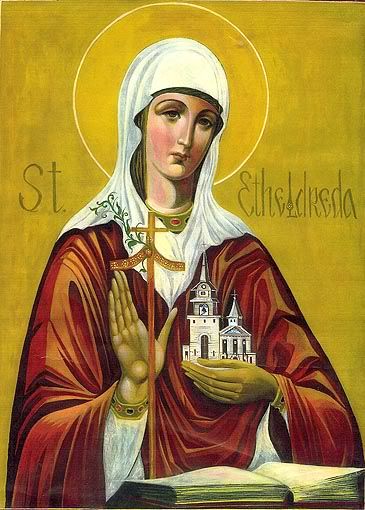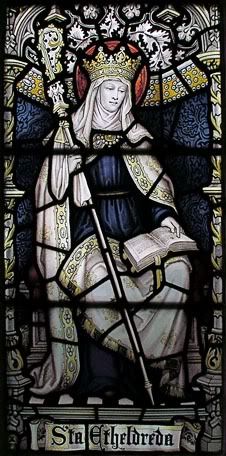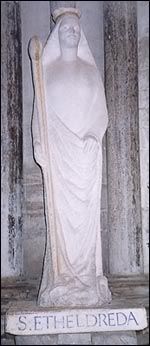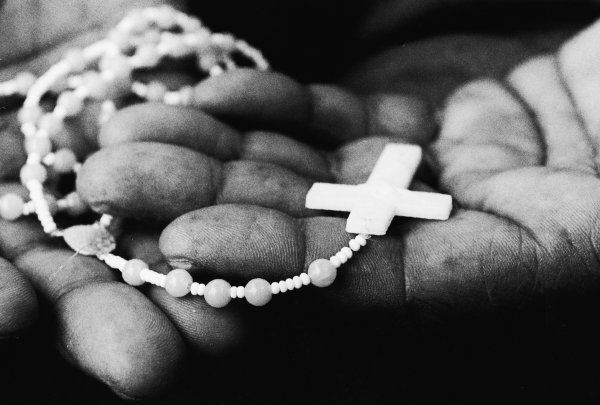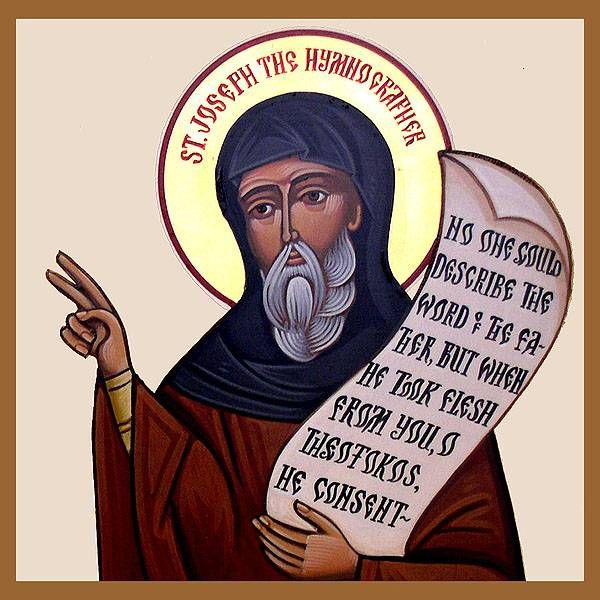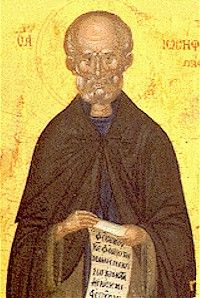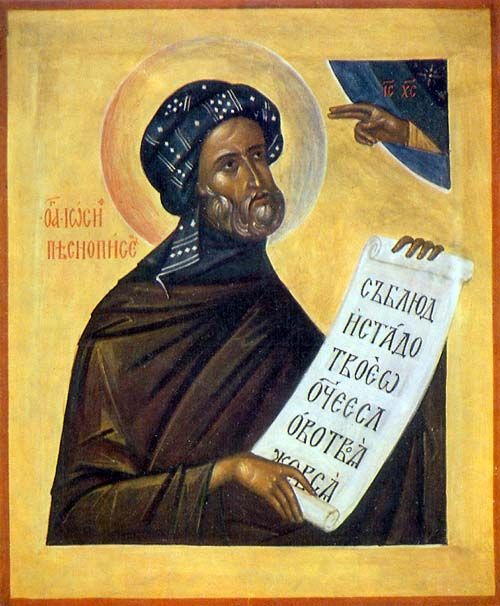As today is the feast of the nativity of my confirmation saint, I am re-posting my thoughts from last year. Saint John the Baptist, pray for each of us!
Today, June 24, we celebrate the Solemnity of the Nativity of Saint John the Baptist. For the Church, this is a special day—one of the only feast days of a saint falling on the date of birth, rather than the date on which the saint died (Of course, we also celebrate the beheading of Saint John the Baptist in August). Ordinarily the Church observes the day of a saint's death as his feast, because that day marks his entrance into heaven. To this rule there are two notable exceptions, the birthdays of Blessed Mary (celebrated on September 8) and of Saint John the Baptist. All other persons were stained with original sin at birth, preventing a liturgical celebration of the event. But through the grace of God—in preparation for her special role as Mother of God-- Mary, from the first moment of her existence, was free from original sin. Similarly, John was cleansed of original sin in the womb of his mother, jumping for joy at the greeting of Mary to Elizabeth during her visitation (the second Luminous Mystery of the Holy Rosary).
So, today, the Nativity of Saint John the Baptist, is a special day for the Church. For me, this is also a special day, as Saint John is the saint I chose for my confirmation saint—due to his humility, his foresight, his contemplative nature, his tendencies toward penance, self-deprivation, and mortification, and his understanding of his place in the world (that his role was trivial in comparison to that of Christ). Saint Augustine explained the reason for today's observance—an event which heralds the coming of Jesus in anticipation of Christmas-- in the following words:
"Apart from the most holy solemnity commemorating our Savior's birth, the Church keeps the birthday of no other person except that of John the Baptist. (The feasts of the Immaculate Conception and of the Nativity of the Blessed Virgin had not yet been introduced when he wrote this.) In the case of other saints or of God's chosen ones, the Church, as you know, solemnizes the day on which they were reborn to everlasting beatitude after ending the trials of this life and gloriously triumphing over the world.
"For all these the final day of their lives, the day on which they completed their earthly service is honored. But for John the day of his birth, the day on which he began this mortal life is likewise sacred. The reason for this is, of course, that the Lord willed to announce to men His own coming through the Baptist, lest if He appeared suddenly, they would fail to recognize Him. John represented the Old Covenant and the Law. Therefore he preceded the Redeemer, even as the Law preceded and heralded the new dispensation of grace." (For more from Saint Augustine on the Nativity of Saint John the Baptist, click here.)
Saint John the Baptist is, therefore, the Precursor of Christ, the forerunner of the Son of Justice, the minister of baptism of Jesus. His birth prepared the way for the coming of Our Lord and Savior, for the coming of salvation for all.
57When it was time for Elizabeth to have her baby, she gave birth to a son. 58Her neighbors and relatives heard that the Lord had shown her great mercy, and they shared her joy.
59On the eighth day they came to circumcise the child, and they were going to name him after his father Zechariah, 60but his mother spoke up and said, "No! He is to be called John."
61They said to her, "There is no one among your relatives who has that name."
62Then they made signs to his father, to find out what he would like to name the child. 63He asked for a writing tablet, and to everyone's astonishment he wrote, "His name is John." 64Immediately his mouth was opened and his tongue was loosed, and he began to speak, praising God. 65The neighbors were all filled with awe, and throughout the hill country of Judea people were talking about all these things. 66Everyone who heard this wondered about it, asking, "What then is this child going to be?" For the Lord's hand was with him.
80And the child grew and became strong in spirit; and he lived in the desert until he appeared publicly to Israel. (Luke 1: 57-66, 80)
John was born to Elizabeth, the “cousin” of Mary, and Zechariah, an elderly man and priest at the Temple of Jerusalem. Elizabeth, also in advanced age, was childless and sterile, although both she and Zechariah very much wished to conceive. According to the Gospel of Luke, John’s birth was foretold by the angel Gabriel to Zechariah while he was at work in the Temple. However, he did not belief, and was struck mute until he named his son John. John, the cousin of Jesus, the infant who leapt in the presence of the Lord prior even to his birth in purity, grew and began his public ministry—one which prepared the way for Christ. In this way, his birth and life anticipated that of Jesus. Both births were foretold by message of an angel—one to a virgin, one to a woman unable to conceive. Both men brought all to faith—one through baptism by water, one by the Spirit.
John left his father’s home—giving up considerable honor and privilege (and even some riches, perhaps!)-- and went into the desert when he was just an adolescent (scholars estimate between 12 and 15 years old). There, in the desert near the river Jordan, he entered into a contemplative life of hermitude, communing with the Lord in silence. He began a life of mortification and penance, wearing a camel-hair shirt, and sustaining his body with locusts and honey. Soon, he gained notoriety as a pious and holy man, and people flocked to him for baptism in the river. He preached reformation of life.
John served the Lord until the age of 29, at which time the angel of the Lord appeared to him, instructing him to proclaim the coming of Christ, preach penance, and to continue baptizing the many. The angel also informed John that Jesus was the Savior of the World, whom John should baptize (the Second Luminous Mystery of the Holy Rosary), and upon whom the Holy Spirit would descend in the form of a dove.
Jesus called John the greatest of all those who had preceded him, saying: “I tell you, among those born of women, no one is greater than John....” But John would have agreed completely with what Jesus added: “Yet the least in the kingdom of God is greater than he.” (Luke 7:28). Saint John lived the words “He must increase; I must decrease,” (John 3:30) believing them to the core of his being. His purpose was to prepare the way for Jesus. The baptisms John performed were baptisms of repentance and reformation. But the baptisms that Jesus would bring to the world would be through the Holy Spirit and fire. John recognized his role, his insignificance in comparison to the greatness of Christ, and proclaimed himself unworthy to even carry the sandals of Jesus. He said:
31"The one who comes from above is above all; the one who is from the earth belongs to the earth, and speaks as one from the earth. The one who comes from heaven is above all. 32He testifies to what he has seen and heard, but no one accepts his testimony. 33The man who has accepted it has certified that God is truthful. 34For the one whom God has sent speaks the words of God, for God gives the Spirit without limit. 35The Father loves the Son and has placed everything in his hands. 36Whoever believes in the Son has eternal life, but whoever rejects the Son will not see life, for God's wrath remains on him." (John 3: 31-36)
Today is a special day for the Chuch, for all the faithful! In the words of Blessed Guerric of Igny (c.1080-1157), Cistercian abbot, from his sermon on the Nativity of Saint John the Baptist:
"Rightly, then, did the birth of this child make many rejoice then and does make many rejoice today: born in the old age of his parents he was to preach the grace of rebirth to an aging world. Rightly does the Church solemnly venerate this birth, which is wonderfully brought about by grace and at which nature wonders. To me certainly the birth of the world's Lamp (John 5:35) brings fresh joy, for it enabled me to recognize the true Light shining in the darkness but not mastered by the darkness, (Jn1,5.9).
His birth brings me a joy utterly unspeakable, for so many outstanding benefits accrue to the world through it. He is the first to give the Church instruction, to initiate it by penance, to prepare it by baptism. When it is prepared he delivers it to Christ and unites it with him, (John 3:29). He both trains it to live temperately and, by his own death, gives it the strength to die with fortitude. In all these ways he prepares for the Lord a perfect people, (Luke 1:17).”
All powerful God,
help Your people to walk the path to salvation.
By following the teaching of St. John the Baptist,
may we come to your Son, our Lord Jesus Christ,
who lives and reigns with You and the Holy Spirit,
one God, for ever and ever.
Amen.
Why pray the Rosary every day for a year?
Each time the Blessed Virgin has appeared-- whether it be to Saint Bernadette Soubirous at Lourdes; to Lucia, Jacinta, and Francisco at Fatima; or to Mariette Beco at Banneux-- she has asserted the importance, saving grace, and power of praying the Holy Rosary on a daily basis. Based upon her words, the Rosary is penance and conversion for sinners, a pathway to peace, an end to war, and a powerful act of faith in Jesus Christ. Pope Paul VI presented the Rosary as a powerful means to reach Christ "not merely with Mary but indeed, insofar as this is possible to us, in the same way as Mary, who is certainly the one who thought about Him more than anyone else has ever done."
To show us how this is done, perhaps no one has been more eloquent than the great Cardinal Newman, who wrote: "The great power of the Rosary consists in the fact that it translates the Creed into Prayer. Of course, the Creed is already in a certain sense a prayer and a great act of homage towards God, but the Rosary brings us to meditate again on the great truth of His life and death, and brings this truth close to our hearts. Even Christians, although they know God, usually fear rather than love Him. The strength of the Rosary lies in the particular manner in which it considers these mysteries, since all our thinking about Christ is intertwined with the thought of His Mother, in the relations between Mother and Son; the Holy Family is presented to us, the home in which God lived His infinite love."
As Mary said at Fatima, "Jesus wants to use you to make Me known and loved. He wishes to establish the devotion to My Immaculate Heart throughout the world. I promise salvation to whoever embraces it; these souls will be dear to God, like flowers put by Me to adorn his throne."

comments (1)
|
Labels:
Faith,
Holy Spirit,
Jesus,
Luminous Mysteries,
Reparation,
Service,
Solemnity,
Truth
Today, June 23, we celebrate the feast day of Saint Etheldreda (also known as Saint Audrey, 636-379), ascetic, queen, and foundress of the “double monastery” at Ely. Against earthly pressures, and through divine intervention, Saint Etheldreda maintained her personal consecration to the Lord, remaining a virgin and engaging in ascetic pursuits despite her noble station. Her perseverance in faith and commitment to a life of prayer and service is remarkable still today.
Born in Northumbria, the daughter of a king, Etheldreda was brought up in a God-fearing household. From an early age, Etheldreda had but one goal: to consecrate herself entirely to the Lord through entrance into a religious order. Etheldreda longed to fully serve with her life, her wealth, and her actions. Her father, on the other hand, had other plans for her. For political reasons, Etheldreda was married (at quite a young age) to a prince named Tonbert, from who she received a track of land on the Isle of Ely. For three years the couple lived together, and due to her young age and commitment to sanctity, Etheldreda was able to maintain her purity. Upon Tonbert’s untimely death, she relocated to the Isle of Ely, where she intended to devote herself to entirely spiritual pursuits.
However, it was not to be. Her father, again sensing political opportunity, arranged for a second marriage, this time to the young son of the powerful king of Northumbria, Egfrith. Etheldreda obeyed her father’s wishes, but chose to live in the royal palace as a sister to the king, rather than a wife. This was not problematic, due to the youth of the boy, who would sit at Etheldreda’s feet, learning Scripture from her. For twelve years, Etheldreda engaged in purely ascetic activities, forgoing the accoutrements and privilege of her position, and maintaining her purity. Etheldreda became known for devoting her time to works of mercy and love, while observing a scrupulous regularity of discipline.
At the age of twenty-four, Egfrith ascended to the throne of Northumbria, becoming king. As Queen, Etheldreda delighted in the society of monks and nuns, and took care to invite and attract to her those most distinguished for learning and piety. Among these was St. Cuthbert, the young Prior of Lindisfarne, upon whose monastery she bestowed many gifts from her own private property. Over time, Etheldreda became friends with Saint Wilfrid, her confessor, who on her behalf, encouraged the king to allow her to retire for some years to the Convent at Coldingham Abbey. There, she lived as a sister, having received the veil from Saint Wilfrid himself. Her husband, the king, shortly after consenting to her departure from the royal court, changed his mind and pursued her. When Saint Wilfrid pleaded on her behalf, the king made his intentions known: he would find Etheldreda and bring her back to the court by force, where he would consummate his marital privileges.
Etheldreda fled toward her land on the Isle of Ely, with the king in pursuit. She took refuge on a headland on the southern coast of England where a miracle prevented further advance of the king. While she was standing on a large outcropping of rock, the tide rose such that it created an island of refuge for the saint, water surrounding her. Etheldreda remained in this island refuge for seven days, until her royal spouse, recognizing the divine will, agreed to leave her in peace.
Etheldreda, freed from her marriage, continued on her trek to the Isle of Ely. On one extremely hot day during her travels, legend tells us that Etheldreda was overpowered with fatigue. She stuck her staff into the ground and lay down to rest on the open plain. When she awoke, the staff had put forth leaves and branches, and it afterwards became a mighty oak tree, larger than any other for many miles around.
At length, after many days of weary walking, the saint arrived on her own lands in Ely. There, she established a “double monastery,” shepherding both nuns and monks. Saint Wilfrid appointed her abbess, and she governed the abbey for many years, serving as advisor to the pope and other Church officials during that time. Etheldreda ruled over her monastery for seven years, setting a great example of piety and abstinence and all other monastic virtues. Though of royal lineage, and having been delicately reared, Etheldreda abstained from all luxuries. She never wore any linen, but only rough woolen clothing. She denied herself the use of the warm bath, only using the bath that had already served the other nuns. Many of her old friends, relations, and courtiers followed her and her example, engaging in ascetic practices, discipline, and prayer. The monastery grew considerably under her holy leadership
Not only holy and a model of virtue in shepherding her people to the Lord, Etheldreda also was graced with the gift of prophecy. Most notable of her prophecies was that of her own death by plague, and the exact number of her monks and nuns who would be carried off by the same epidemic. True to her prophesy, Etheldreda died of a quinsy, a form of plague which led to the development of a large tumor upon her neck. Etheldreda, never complaining about the pain or the sight of the growth, regarded is as a punishment for her former love of fine clothing, and, in particular, for having worn jewels on her neck.
Seventeen years after her death, Saint Wilfrid and Saint Etheldreda’s physician discovered her body to be incorrupt. The incision that had been made into her tumor shortly before she died had miraculously healed in death. (Saint Etheldreda remains the patron of sufferers of throat complaints.) The linen cloths in which her body was wrapped were as fresh as the day she had been buried. Her body was placed in a stone sarcophagus and reburied at the Abbey. Unfortunately, the tomb of Saint Etheldreda was desecrated during the English Reformation, with only the incorrupt hand of the blessed saint surviving. Her relics remain at St Etheldreda's Roman Catholic church at Ely, where many miracles have been reported through her intercession.
The life of Saint Etheldreda reminds us that we cannot truly be servants of Christ when our souls are distracted by the pleasures and desires of the world. In her wisdom, Saint Etheldreda gave up her wealth, station, and privilege, instead choosing to live the ascetic life of a abbess, guiding people to Christ and contributing to His kingdom on earth. We might take a lesson from Saint Etheldreda today, examining what binds us to the world, preventing us from truly and fully serving our Creator.
Eternal God,
who bestowed such grace upon your servant Etheldreda
that she gave herself wholly to the life of prayer
and to the service of your true religion:
grant that we, like her,
may so live our lives on earth seeking your kingdom
that by your guiding
we may be joined to the glorious fellowship of your saints; through Jesus Christ our Lord. Amen.
Born in Northumbria, the daughter of a king, Etheldreda was brought up in a God-fearing household. From an early age, Etheldreda had but one goal: to consecrate herself entirely to the Lord through entrance into a religious order. Etheldreda longed to fully serve with her life, her wealth, and her actions. Her father, on the other hand, had other plans for her. For political reasons, Etheldreda was married (at quite a young age) to a prince named Tonbert, from who she received a track of land on the Isle of Ely. For three years the couple lived together, and due to her young age and commitment to sanctity, Etheldreda was able to maintain her purity. Upon Tonbert’s untimely death, she relocated to the Isle of Ely, where she intended to devote herself to entirely spiritual pursuits.
However, it was not to be. Her father, again sensing political opportunity, arranged for a second marriage, this time to the young son of the powerful king of Northumbria, Egfrith. Etheldreda obeyed her father’s wishes, but chose to live in the royal palace as a sister to the king, rather than a wife. This was not problematic, due to the youth of the boy, who would sit at Etheldreda’s feet, learning Scripture from her. For twelve years, Etheldreda engaged in purely ascetic activities, forgoing the accoutrements and privilege of her position, and maintaining her purity. Etheldreda became known for devoting her time to works of mercy and love, while observing a scrupulous regularity of discipline.
At the age of twenty-four, Egfrith ascended to the throne of Northumbria, becoming king. As Queen, Etheldreda delighted in the society of monks and nuns, and took care to invite and attract to her those most distinguished for learning and piety. Among these was St. Cuthbert, the young Prior of Lindisfarne, upon whose monastery she bestowed many gifts from her own private property. Over time, Etheldreda became friends with Saint Wilfrid, her confessor, who on her behalf, encouraged the king to allow her to retire for some years to the Convent at Coldingham Abbey. There, she lived as a sister, having received the veil from Saint Wilfrid himself. Her husband, the king, shortly after consenting to her departure from the royal court, changed his mind and pursued her. When Saint Wilfrid pleaded on her behalf, the king made his intentions known: he would find Etheldreda and bring her back to the court by force, where he would consummate his marital privileges.
Etheldreda fled toward her land on the Isle of Ely, with the king in pursuit. She took refuge on a headland on the southern coast of England where a miracle prevented further advance of the king. While she was standing on a large outcropping of rock, the tide rose such that it created an island of refuge for the saint, water surrounding her. Etheldreda remained in this island refuge for seven days, until her royal spouse, recognizing the divine will, agreed to leave her in peace.
Etheldreda, freed from her marriage, continued on her trek to the Isle of Ely. On one extremely hot day during her travels, legend tells us that Etheldreda was overpowered with fatigue. She stuck her staff into the ground and lay down to rest on the open plain. When she awoke, the staff had put forth leaves and branches, and it afterwards became a mighty oak tree, larger than any other for many miles around.
At length, after many days of weary walking, the saint arrived on her own lands in Ely. There, she established a “double monastery,” shepherding both nuns and monks. Saint Wilfrid appointed her abbess, and she governed the abbey for many years, serving as advisor to the pope and other Church officials during that time. Etheldreda ruled over her monastery for seven years, setting a great example of piety and abstinence and all other monastic virtues. Though of royal lineage, and having been delicately reared, Etheldreda abstained from all luxuries. She never wore any linen, but only rough woolen clothing. She denied herself the use of the warm bath, only using the bath that had already served the other nuns. Many of her old friends, relations, and courtiers followed her and her example, engaging in ascetic practices, discipline, and prayer. The monastery grew considerably under her holy leadership
Not only holy and a model of virtue in shepherding her people to the Lord, Etheldreda also was graced with the gift of prophecy. Most notable of her prophecies was that of her own death by plague, and the exact number of her monks and nuns who would be carried off by the same epidemic. True to her prophesy, Etheldreda died of a quinsy, a form of plague which led to the development of a large tumor upon her neck. Etheldreda, never complaining about the pain or the sight of the growth, regarded is as a punishment for her former love of fine clothing, and, in particular, for having worn jewels on her neck.
Seventeen years after her death, Saint Wilfrid and Saint Etheldreda’s physician discovered her body to be incorrupt. The incision that had been made into her tumor shortly before she died had miraculously healed in death. (Saint Etheldreda remains the patron of sufferers of throat complaints.) The linen cloths in which her body was wrapped were as fresh as the day she had been buried. Her body was placed in a stone sarcophagus and reburied at the Abbey. Unfortunately, the tomb of Saint Etheldreda was desecrated during the English Reformation, with only the incorrupt hand of the blessed saint surviving. Her relics remain at St Etheldreda's Roman Catholic church at Ely, where many miracles have been reported through her intercession.
The life of Saint Etheldreda reminds us that we cannot truly be servants of Christ when our souls are distracted by the pleasures and desires of the world. In her wisdom, Saint Etheldreda gave up her wealth, station, and privilege, instead choosing to live the ascetic life of a abbess, guiding people to Christ and contributing to His kingdom on earth. We might take a lesson from Saint Etheldreda today, examining what binds us to the world, preventing us from truly and fully serving our Creator.
Eternal God,
who bestowed such grace upon your servant Etheldreda
that she gave herself wholly to the life of prayer
and to the service of your true religion:
grant that we, like her,
may so live our lives on earth seeking your kingdom
that by your guiding
we may be joined to the glorious fellowship of your saints; through Jesus Christ our Lord. Amen.
"And pray in the Spirit on all occasions
with all kinds of prayers and requests. With this in mind, be alert and always
keep on praying for all the saints." (Ephesians 6:18)
"Do not be anxious about anything, but in everything, by prayer and petition, with thanksgiving, present your requests to God." (Philippians 4:6)
For improved prayer life, for the faith of a
parish, for the ill (B, Singapore);
For strength, for healing of a relationship (M, Ireland); For healing of serious illness (J, United Kingdom); For a son experiencing difficulties, that
he may be healed (M, USA-NY); For
healing upon a family (M, India); For
multiple intentions, including health, occupational, and financial (S,
Australia); For good mental health,
continued relationship with the Lord, and safekeeping of a home (V,
USA-AL); For a nephew battling
addiction, for strained family relationships, for true conversion and healing
of a family (A, India); For successful
employment, for a relationship blessed by the Lord (N, India); Successful employment, financial security
(J, Ghana); Grace of God to fill life and overcome flaws (R, USA-VA); Help for a family in financial trouble,
freedom from anxiety and depression (B, Ireland); Career success (R, USA-NY);
For curing of a serious blood disorder, comfort for a niece who lost her
husband (M, USA-IL); Blessings upon a
ministry and school, for health, healing, peace, protection, and for someone
battling with addiction and mental illness (B, USA-AL); Blessings and healing upon husband, brother,
son, and family (B, USA-CA); For
faculty and students at school, that they be filled with patience and
understanding (E, England); Successful
employment, grace and strength (B, USA-MA); For personal intentions (C,
USA-GA).
"Hear my prayer, O
God; listen to the words of my mouth." (Psalm 54:2)
"If you believe, you will receive whatever
you ask for in prayer."
(Matthew 21:22)
"And pray in the Spirit on all occasions
with all kinds of prayers and requests. With this in mind, be alert and always
keep on praying for all the saints." (Ephesians 6:18)
"Do not be anxious about anything, but in everything, by prayer and petition, with thanksgiving, present your requests to God." (Philippians 4:6)
Financial blessings upon a family (A, USA-CA); Successful occupational and academic placements for a family moving between countries (S, India); Healing of a marriage and strained family relationships (J, Kenya); For a son in period of vocational discernment (A, USA-MD); For blessings and financial favor for family and friends (S, USA-MO); For a friend suffering from addiction (S, Canada); For a friend dealing with grief and bereavement (J, Norway); Specific prayer intentions (J, Malta); Blessings and healing upon a son (M, USA-NY); Successful completion of education (U, Nigeria); Successful acceptance in the army (U, Norway); End to sadness, protection for home (S, India); Health, safety, and blessings for family and friends (M, Philippines); Blessings and healing upon a strained relationship (K, Serbia); Healing upon a relationship (M, USA-ND); Healing upon a husband and a relationship (R, India).
"Hear my prayer, O
God; listen to the words of my mouth." (Psalm 54:2)
"If you believe, you will receive whatever
you ask for in prayer."
(Matthew 21:22)
Today, June 14, we celebrate the feast day of Saint Joseph the Hymnographer (810-886), tireless servant of the Lord, glorifying Him in life, in works, and through writing countless hymns and canons to the saints. Despite a lifetime of struggle, suffering, and imprisonment, Saint Joseph produced a catalog of writings which remain today, as well as over 200 hymns, many of which are still sung by modern congregations. He has been called "the sweet-voiced nightingale of the Church." Through his legacy of writings and song, Saint Joseph preserved a priceless record of the history of our faith—a faith which continues, unchanged and unabated, today.
Below, two additional hymns, originally penned by Saint Joseph (and later adapted for modern usage in the Church):
And Wilt Thou Pardon, Lord
And wilt Thou pardon, Lord,
A sinner such as I,
Although Thy book his crimes record,
Of such a crimson dye?
So deep are they engraved,
So terrible their fear,
The righteous scarcely shall be saved,
And where shall I appear?
O Thou Physician blest,
Make clean my guilty soul
And me, by many a sin oppressed,
Restore and keep me whole.
I know not how to praise
Thy mercy and Thy love;
But deign my soul from earth to raise
And learn from Thee above.
O Happy Band of Pilgrims
O happy band of pilgrims,
If onward you will tread,
With Jesus as your Fellow,
To Jesus as your Head.
O happy if you labor,
As Jesus did for men;
O happy if you hunger
As Jesus hungered then.
The cross that Jesus carried
He carried as your due;
The crown that Jesus weareth
He weareth it for you.
The faith by which you see Him,
The hope in which you yearn,
The love that through all troubles
To Him alone will turn.
What are they but forerunners
To lead you to His sight?
What are they save the effluence
Of uncreated Light?
The trials that beset you,
The sorrows you endure,
The manifold temptations
That death alone can cure.
What are they but His jewels
Of right celestial worth?
What are they but the ladder
Set up to heaven on earth?
O happy band of pilgrims,
Look upward to the skies,
Where such a light affliction
Shall win you such a prize.
To Father, Son, and Spirit,
The God Whom we adore,
Be loftiest praises given,
Now and for evermore.
Below, two additional hymns, originally penned by Saint Joseph (and later adapted for modern usage in the Church):
And Wilt Thou Pardon, Lord
And wilt Thou pardon, Lord,
A sinner such as I,
Although Thy book his crimes record,
Of such a crimson dye?
So deep are they engraved,
So terrible their fear,
The righteous scarcely shall be saved,
And where shall I appear?
O Thou Physician blest,
Make clean my guilty soul
And me, by many a sin oppressed,
Restore and keep me whole.
I know not how to praise
Thy mercy and Thy love;
But deign my soul from earth to raise
And learn from Thee above.
O Happy Band of Pilgrims
O happy band of pilgrims,
If onward you will tread,
With Jesus as your Fellow,
To Jesus as your Head.
O happy if you labor,
As Jesus did for men;
O happy if you hunger
As Jesus hungered then.
The cross that Jesus carried
He carried as your due;
The crown that Jesus weareth
He weareth it for you.
The faith by which you see Him,
The hope in which you yearn,
The love that through all troubles
To Him alone will turn.
What are they but forerunners
To lead you to His sight?
What are they save the effluence
Of uncreated Light?
The trials that beset you,
The sorrows you endure,
The manifold temptations
That death alone can cure.
What are they but His jewels
Of right celestial worth?
What are they but the ladder
Set up to heaven on earth?
O happy band of pilgrims,
Look upward to the skies,
Where such a light affliction
Shall win you such a prize.
To Father, Son, and Spirit,
The God Whom we adore,
Be loftiest praises given,
Now and for evermore.
Subscribe to:
Posts (Atom)

















